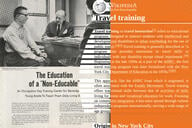You have /5 articles left.
Sign up for a free account or log in.
With record enrollments this Fall, we've added unprecedented numbers of new sections. That means we've hired dozens of new adjuncts, and given returning adjuncts as many courses as our policy allows.
But we haven't added any new staff. And they're gonna feel it.
Double-digit enrollment increases bring with them double-digit increases in the numbers of applications processed, placement tests administered, financial aid packages requested, immunization records checked and kept, and tutoring and counseling appointments made. The folks who work in those offices aren't getting any more hands on deck. In fact, with the level of budget cuts we've sustained thus far, the fact that we've avoided layoffs is remarkable. (Some of our neighboring cc's haven't been so lucky.) We've done some cuts by attrition, not replacing people who've left, but we haven't kicked anybody out. In some areas, 20% less staff are being asked to handle 20% more students than two years ago, and to do it with thinner operating budgets (which is to say, less money for overtime).
Naturally, some folks are starting to grumble. I don't blame them, even as I don't really have an answer for them.
Politically, hiring office staff is a harder sell than hiring faculty. Faculty are conspicuous, and the tie to the classroom is obvious. Back-office support staff are inconspicuous, and show up in public discussion as 'overhead' or 'administrative bloat.' But their work is necessary, as anyone whose financial aid package got lost in the shuffle can attest. And the relative lack of romance in back-office work means that good people aren't willing to accept adjunct-level wages to do it; adding staff means full-time salaries with benefits. (There's some limited ability to use work-study students in a few roles, and funding for that has actually increased. It helps on the margins, but anything sensitive is out of the question.) We can't expand capacity on the cheap with staff, the way that we usually can with faculty.
Worse, much of the back-office staff work only becomes visible when it fails. Inspired teaching is visible; effective paper-processing isn't. Perversely, success becomes an argument against additional investment: why do you need more staff when the current staff is getting the job done? Failure, too, is an argument against additional investment: why pour good money after bad, or why reward failure?
In some areas, the nature of the work is specialized enough that you can't just swing in some temps at crunch times and expect them to produce. That strategy works reasonably well with unskilled positions, but you don't want untrained people processing financial aid applications. No good can come of that.
It's bizarre, but true, that it's easier to add capacity on the teaching side than on the staff side. Given how subject-specific teaching is, I wouldn't guess that, but it's true. The classes will get taught. The rest, we'll hope for the best.



